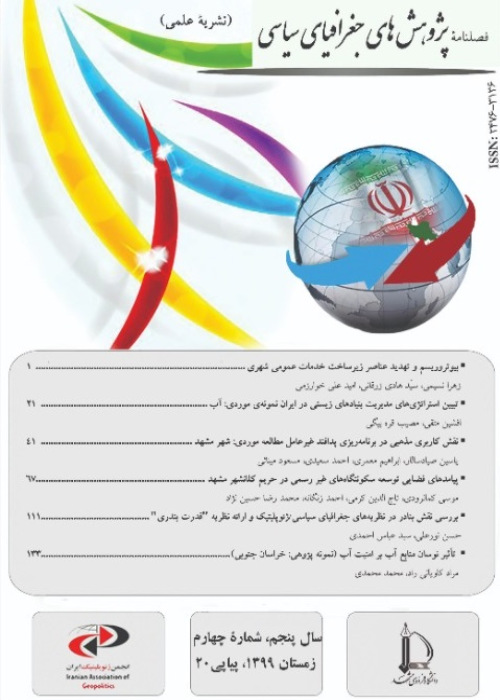Evaluation of Geopolitical Variables’ Impact on the Formation and Activity of Terrorist Groups (Case Study: Border Areas of Afghanistan and Pakistan)
1.
The issue of terrorism in the third millennium has become one of the central issues of the world changes and the interconnection between powers and countries. One of the areas that is heavily affected by terrorism and its implications is South Asia, particularly the two countries, Afghanistan and Pakistan. In the past few decades, these two countries have always been under the influence of terrorism, and, in some cases, even released and transferred terrorism to other areas of the world. One of the most important dimensions of terrorism in this area is the geopolitical dimension of this phenomenon and the impact of geopolitical variables on the formation and activity of terrorist groups. Variables and geopolitical phenomena that are shaped by interaction of geography and power are among the crucial extraterritorial, transnational, and effective factors in the formation and activity of terrorist groups in Afghanistan and Pakistan. Certainly, the identification and analyses of these geopolitical variables will significantly help to understand the formation reasons and the activity of terrorist groups in these two countries. Therefore, the main objective of this study is to identify, evaluate and weigh the geopolitical variables that are effective in the formation and activity of terrorist groups in the border areas between Afghanistan and Pakistan.
2.
Theoretical Framework
The temporal and spatial distribution of terrorist events on a global scale can have one of the following four patterns: random, heterogeneous, reinforcement and contagion. In fact, the attacks are either randomly distributed in space and time, or followed by the other three non-random patterns. The heterogeneous pattern implies that the experience of different countries about terrorism is disparate in space but is constant over time. Reinforcement also points out that terrorist incidents in a country will likely be intensified in the future in the same country. Contagion means that the occurrence of terrorist events in a country is likely to cause the occurrence of such events in the neighboring countries. It can be concluded that many countries experience a period of terrorist incidents that have not experienced before. Another point is that the contagion does not occur only through the geographical boundaries, but also in a non- contiguous manner. Non-contiguous contagion is a process that may involve collaboration of terrorist groups in such relationships as spying, training, budgeting, and supporting.
Because of having the resources, facilities, and appropriate information, terrorist groups that are supported by governments are often able to carry out more deadly attacks than other terrorists. Therefore, the terrorist operations of tyrannical governments are more responsible than individual terrorism operations for the victims and miseries. Secret brutality of state terrorists will have a low cost for the supporting government, and if it is used properly and secretly against strong enemies, it can prevent international punishment or retaliation.
From the geopolitical viewpoint, the world is in the midst of great chaos. On the one hand, multilateral regional unions have been developed (such as the European Union, NAFTA, Mercosur, APEC, etc.), and, on the other hand, a renaissance of nationalism, the emergence of fundamentalism, pro-independence movements and the autonomy of a minority are appeared. Most of conflicts are internal in that a part of the population opposes the central authority. Today, after the collapse of the bipolar system and the challenge of the US unipolar order by other rival powers, the world is in a long-term transitional period that has not yet reached a new and consistent order. Hence, there is a kind of disorder, mismanagement and lack of integrated control over global changes and the formation and activity of terrorist groups is one of its indicators.
3.
This research is a descriptive-analytic study that intends to identify geopolitical variables that affect the formation and activity of terrorist groups. In terms of collecting information, a library method and a questionnaire were used. SPSS software was used to validate and weigh the variables.
4.
Findings and Discussion
By investigating library documents and field findings show that eight geopolitical variables including " locating among critical states and regions," " foreign supports from institutions which promote fundamentalism ", " long, penetrable and far from the center geographic borders "," geographic affinity among ethnic-religious groups in two sides of the borders "," geopolitical rivalry between powers ", " lack of regional or global hegemonic power ", "buffer situation ", " border and territorial conflicts with neighboring states" as well as 21 categories related to these variables are impact in formation and the activities of terrorist groups in the border areas between Afghanistan and Pakistan. Also, descriptive and inferential statistics (T-test) indicate that the average score of all eight geopolitical variables is significantly higher than the standard mean (x=3). Therefore, the effectiveness of these geopolitical variables in the formation and activity of terrorist groups in the border areas between Afghanistan and Pakistan is also confirmed by experts.
- حق عضویت دریافتی صرف حمایت از نشریات عضو و نگهداری، تکمیل و توسعه مگیران میشود.
- پرداخت حق اشتراک و دانلود مقالات اجازه بازنشر آن در سایر رسانههای چاپی و دیجیتال را به کاربر نمیدهد.


